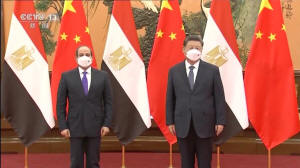China's Xi meets more heads of state in Winter Games diplomatic push
 Send a link to a friend
Send a link to a friend
 [February 05, 2022]
BEIJING (Reuters) -Chinese President
Xi Jinping met the leaders of several more countries on Saturday as
Beijing used the start of the Winter Olympics to score diplomatic points
amid simmering tensions with the United States. [February 05, 2022]
BEIJING (Reuters) -Chinese President
Xi Jinping met the leaders of several more countries on Saturday as
Beijing used the start of the Winter Olympics to score diplomatic points
amid simmering tensions with the United States.
Following a groundbreaking agreement with Russia on Friday over Taiwan
and against NATO expansion, Xi held meetings with the leaders of Serbia,
Egypt, Kazakhstan, Uzbekistan and Turkmenistan and hosted a banquet at
Beijing's Great Hall of the People.
Over 30 foreign leaders travelled to Beijing to attend Friday's opening
ceremony. But the United States and other Western countries have
subjected the Winter Games to a diplomatic boycott amid rising
geopolitical tensions and allegations of human rights abuses in China's
northwestern region of Xinjiang.
The Global Times, run by the ruling Communist Party's People's Daily,
hit back at foreign media reports that the event had attracted only
"authoritarian" leaders, accusing them in an editorial of using
"outdated anti-China cliches".
Saturday's Lunar New Year-themed banquet was the first time the Chinese
president has joined a gathering of state leaders since before the
outbreak of COVID-19 in late 2019.
Toasting his fellow leaders, Xi expressed "heartfelt thanks to all
governments, peoples and international organisations who care about and
support the Beijing Winter Olympics".

"China has made every effort to overcome the impact of the coronavirus
epidemic, earnestly fulfilled its solemn commitments to the
international community and ensured the Beijing Winter Olympics is being
held as scheduled," Xi said in a speech published by Xinhua news agency.
The People's Daily described strengthened China-Russian relations -
announced by Xi and Russian President Vladimir Putin after they met on
Friday - as "an important guarantee for maintaining an international
strategic balance, world peace and stability". The Global Times called
it the start of a new era "not defined by the United States".
[to top of second column]
|

Chinese President Xi Jinping met with the leaders of Serbia, Egypt,
Kazakhstan and Turkmenistan on Saturday as Beijing used the opening
of the Winter Olympics to seize the diplomatic initiative amid
simmering tensions with the United States.
 MEETINGS
Xi held individual meetings with Kazakhstan President Kassym-Jomart
Tokayev, Serbia's President Aleksandar Vucic and President Abdel
Fatta Al-Sisi of Egypt on Saturday morning, Xinhua news agency
reported, discussing Belt and Road-related infrastructure
investments and cooperation in the fight against COVID-19.
He also told Turkmenistan President Gurbanguly Berdymukhamedov that
the two sides should deepen cooperation on supplying natural gas to
China.
Xi also met Uzbek President Shavkat Mirziyoyev, while Chinese
Premier Li Keqiang held meetings with Ecuador's President Guillermo
Lasso, Singapore's President Halimah Yacob and the director general
of the World Health Organization, Tedros Adhanom Ghebreyesus.
Kevin Rudd, former prime minister of Australia and president of the
Asia Society, described the joint statement issued by Xi and Putin
as "highly significant".
It was "the first time since the Sino-Soviet split that China's
taken a definitive position on European security to support Russia
on something as fundamental as NATO", Rudd wrote on Saturday.
The "no limits" agreement for a strategic partnership included
Russian support for China's opposition to any form of independence
for Taiwan, and China's backing for Russian opposition to further
expansion of NATO.
Russia has amassed 100,000 troops near its border with Ukraine as it
tries to pressure the country into ruling out future NATO membership
for the country. Moscow has denied it plans to invade.
Taiwan's Foreign Ministry called the timing of the agreement
"contemptible", and added that the Chinese government was bringing
shame to the spirit of the Games.
(Reporting by David StanwayEditing by Kim Coghill, Alison Williams
and Frances Kerry)
[© 2022 Thomson Reuters. All rights
reserved.] This material may not be published,
broadcast, rewritten or redistributed.
Thompson Reuters is solely responsible for this content. |